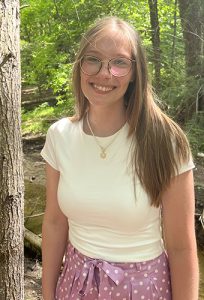Katrina Webster – Understanding the impacts of offshore wind technology

2023 Mitchell Center Intern
Academic Program: Anthropology & Environmental Policy
Project: Understanding the Impacts of Off-Shore Wind Technology
Team Leader: Christine Beitl
What problem/s are you working to solve?
As the transition toward clean, renewable energy gains traction in Maine, it’s vital to consider the impacts of offshore wind technology on fishermen and marine industries. By working with staff from the Department of Marine Resources and the Maine Coast Fishermen’s Association, our team hopes to use participatory mapping and storytelling to document historical uses of the area designated for the Maine Offshore Wind Research Array.
What progress are you making toward solutions?
While we prepare to interview Maine fishermen, we are building a database of existing oral history audio files and transcripts for qualitative analysis. This is allowing us to gain a better understanding of the cultural landscape of Maine fisheries.
How could your findings contribute to a sustainable future in Maine and beyond?
It is our hope that this oral history project will encourage productive conversations and collaborations. Meaningful engagement with stakeholders in maritime and fishing industries will be vital now—in the development state—but also during the sustainable construction and operation of offshore wind infrastructure.
Why did you get involved with this internship project?
I was immediately drawn to the storytelling aspect of this internship. Up until this point, my interest in narratives has been to understand the impacts of protected areas on local communities and more-than-human species. This felt like an opportunity for me to continue exploring my interests in open-ended interviewing and the power of storytelling.
What do you find rewarding about collaborating with stakeholders? Most challenging?
I find listening to be the most rewarding part of collaboration. I think there’s a lot of power in showing up, showing interest, and reflecting upon the shared knowledge. The most challenging part of collaborative work is the organization; finding time for in-depth interviews or meetings among stakeholders is always an obstacle.
Where do you hope to be in five years?
I hope I’m involved in work that uses multispecies storytelling to integrate nature across economic and public sectors.
What’s your ultimate Maine experience?
I think my ultimate Maine experience is the same one I try to achieve in any location. I want to keep exploring new passions as they develop. I want to be mindful of my surroundings, learn about the history of the space I’m in, and spend as much time in nature as possible.
